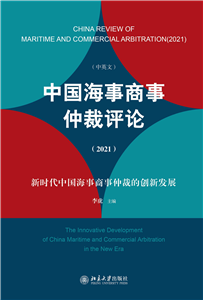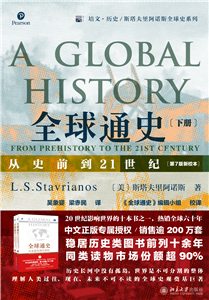基本信息 Information

中国海事商事仲裁评论(2021):新时代中国海事商事仲裁的创新发展
目录
从一起伦敦仲裁案看同步仲裁与合并仲裁在实务中的应用及
若干法律问题
一、案情简介
二、案件处理
三、同步仲裁与合并仲裁
四、当前英美法系对合并仲裁或同步仲裁的态度
五、合并仲裁或同步仲裁可能面临的问题
结语
航空地服合同争议的仲裁关注点
一、航空地服合同是否属于委托合同,当事人是否有法定的
单方任意合同解除权
二、如何理解航空地服合同中的免责条款
三、航空地服合同纠纷中服务费及代垫费用的事实认定
四、航空地服合同的仲裁条款
临时仲裁制度及司法审查相关问题研究
前言
一、我国临时仲裁制度的晚近探索与实践
二、《仲裁法》纳入临时仲裁制度的重要意义
三、建立临时仲裁司法审查制度的若干建议
结论
论“合并仲裁”规则
——兼评《中国海事仲裁委员会仲裁规则》第19条的理解、
适用及完善
一、合并仲裁制度的产生背景与制度价值
二、比较法上的合并仲裁——以美国的合并仲裁实践为例
三、强制合并仲裁的逻辑——默示合并合意的解释
四、合并仲裁的构成要件——在不同仲裁规则视角下
五、我国司法实践对合并仲裁的回应
六、《中国海事仲裁委员会仲裁规则》第19条的理解与适用
七、《中国海事仲裁委员会仲裁规则》第19条的完善建议
结语
数字贸易知识产权风险分析与管理
一、数字贸易的范围与特点
二、数字贸易知识产权风险分析
三、数字平台内经营者知识产权风险管理
四、数字贸易知识产权保证
结论
后疫情时代世界海事仲裁发展概况
中国篇
内地
一、海事仲裁相关法律的发展
二、海事仲裁的发展
三、海事仲裁相关司法实践的发展
结语
香港特区
引言
一、专业知识
二、独立和公正的法律体系
三、《仲裁条例》(第609章)
四、关于内地与香港特别行政区法院就仲裁程序相互
协助保全的安排
五、裁决书的执行
六、实体法
七、香港特区海事仲裁的惯常做法、HKMAG仲裁规则及
机构仲裁程序
八、建议使用的仲裁条款
新加坡篇
一、技术的使用
二、仲裁庭组成
三、开庭审理
四、裁决作出的期限
五、提高适用简易程序的限额
六、任命仲裁员的标准条款
七、变更代理人须经仲裁庭批准
结论
英国篇
引言
一、英国法律下的仲裁程序
二、重要更新
三、伦敦海事仲裁规则和发展情况
四、近期的案例法
结语
国际海洋法法庭迅速释放案件中主体特点及对中国的启示
引言
一、迅速释放程序中的船旗国
二、迅速释放程序中的专属经济区所属国
三、迅速释放案件对我国的启示
结论
完善司法支持监督仲裁机制促进中国仲裁事业高质量发展
一、依法履行司法审查职能,引导仲裁行业健康发展
二、发布司法解释和规范性文件,营造支持仲裁友善监督的
司法环境
三、参与仲裁法修订,积极推动仲裁法律制度完善
四、建设国际商事纠纷多元化解决机制,支持中国仲裁国际
化发展
国际仲裁中心是形成的
一、国际仲裁中心是仲裁服务软实力动态竞争后形成的
市场格局
二、现代国际商事仲裁发源于专业人士的自发性创造
三、现代国际商事仲裁中心地位的确立是仲裁软实力培育
发展的结果
四、中国特色国际仲裁中心形成之时代机遇
五、中国特色国际仲裁中心形成之策略方向
结语
CONTENT
The Practice and Legal Issues of Concurrent Arbitration and Consolidated
Arbitration from a London Arbitration
Ⅰ. Brief Introduction of the Case
Ⅱ. Handling of the Case
Ⅲ. Concurrent Arbitration and Consolidated Arbitration
Ⅳ. Consolidated/Concurrent Arbitration Under Common Law
Ⅴ. Potential Problems of Consolidated/Concurrent Arbitration
Conclusion
Focuses in Arbitration of Disputes in the Standard Ground Handling
Agreement
Ⅰ. Is SGHA a Commission Contract and Whether the Parties Have
the Statutory Right to Unilaterally and Arbitrarily Rescind the
Agreement
Ⅱ. How to Interpret the Exemption Clause in the SGHA
Ⅲ. Factual Determination of Service Fees and Disbursement Fees
in SGHA Disputes
Ⅳ. The Arbitration Clause of the SGHA
Research on Ad Hoc Arbitration Regime and Its Judicial Review
Foreword
Ⅰ. Recent Exploration and Practice of Chinas Ad Hoc Arbitration
Regime
Ⅱ. The Importance of Incorporating the Ad Hoc Arbitration Regime
into the PRC Arbitration Law
Ⅲ. Some Suggestions on Establishing the Judicial Review System
of Ad Hoc Arbitration
Conclusion
Consolidation Provision in Arbitration Rules: Interpretation and Application
of Article 19 (Consolidation of Arbitrations) of the CMAC Arbitration
Rules and Proposal for Amendments
Ⅰ. Background and Values of Consolidation of Arbitration
Ⅱ. A Comparative Perspective: Consolidation of Arbitrations
in the United States
Ⅲ. The Logic Behind Compulsory Consolidation: Interpretation of
Implicit Consent
Ⅳ. Criteria for Consolidation of Arbitrations: Consolidation
Provisions in Major Institutional Arbitration Rules
Ⅴ. Latest Practice for Judicial Review of Consolidated Arbitration
in China
Ⅵ. CMACs Consolidation Provision (Article 19): Scope of
Application and Interpretation
Ⅶ. Amendment Proposals for Article 19 (Consolidation
of Arbitrations) of the CMAC Arbitration Rules
Conclusion
Intellectual Property Risk Management in Digital Trade
Ⅰ. Digital Trade: Scope and Characteristics
Ⅱ. Analysis of Intellectual Property Risks in Digital Trade
Ⅲ. Intellectual Property Risk Management for Businesses Operating
on Digital Platforms
Ⅳ. Intellectual Property Warranty in Digital Trade
Conclusion
Review of Maritime Arbitration in Post-Covid-19 Era
Report on Development of Maritime Arbitration in
Chinas Mainland (2020-2021)
Ⅰ.Developments in the Law and Legislation Relating to Maritime
Arbitration
Ⅱ.The Development of Maritime Arbitration in Chinas Mainland
Ⅲ.Development of Judicial Practice Relating to Maritime
Arbitration in China
Concluding Remarks
Maritime Arbitration in Hong Kong
Introduction
Ⅰ.Expertise
Ⅱ.An Independent and Impartial Legal System
Ⅲ.The Arbitration Ordinance (Cap. 609)
Ⅳ.Arrangement Concerning Mutual Assistance in Court-ordered
Interim Measures in Aid of Arbitral Proceedings by the Courts of
the Mainland and of the HKSAR
Ⅴ.Enforcement of the Award
Ⅵ.Substantive Law
Ⅶ.The Practice of Hong Kong Maritime Arbitration, the HKMAG
Terms and the Procedures for the Administration of Arbitration
Ⅷ.Recommended Arbitration Clauses
Singapore Maritime Industry Users in a New Era the SCMA Arbitration Rules
(4th Edition)
Ⅰ.The Use of Technology
Ⅱ.Constitution of the Tribunal
Ⅲ.Oral Hearings-optional
Ⅳ.Time Frame for Issuance of an Arbitral Award
Ⅴ.Increased Claim Threshold for Expedited Proceedings
Ⅵ.Standard Terms of Appointment
Ⅶ.Power to Prevent Change of Counsel
Conclusion
Maritime Arbitration in the UK
Introduction
Ⅰ.The Arbitration Process Under English Law
Ⅱ.Important Update
Ⅲ.London Maritime Arbitration Rules and Developments
Ⅳ.Recent Case Law
Summary
Characteristics of Applicants in Prompt Release Cases of the ITLOS
and Enlightenment for China
Introduction
Ⅰ.The Flag State in the Prompt Release Procedure
Ⅱ.The Coastal State with the Exclusive Economic Zone in Prompt
Release Procedure
Ⅲ.The Enlightenment for China in Prompt Release Cases
Conclusion
Improve Judicial Supervision and Support for Arbitration and Promote
the High-quality Development of Arbitration in China
Ⅰ.The Peoples Courts Conduct Judicial Review in a Manner Consistent
with the Rule of Law and Provide Guidance on the Healthy
Development of Arbitration
Ⅱ.The Supreme Peoples Court Publishes Judicial Interpretations
and Normative Documents and Create an Arbitration-friendly
Environment with Judicial Support and Supervision
Ⅲ.The Supreme Peoples Court Participates in the Revision of
the Arbitration Law and Actively Promoting the Improvement of
the Arbitration Legal System
Ⅳ.The Supreme Peoples Court Builds a Diversified Mechanism for the
Settlement of International Commercial Disputes and Supporting the
International Development of Chinese Arbitration
A Review on the Formation of International Arbitration Hub
Ⅰ.The International Arbitration Hub is a Market Pattern
Formed by Dynamic Competition in the Soft Power of
Arbitration Services
Ⅱ.Modern International Commercial Arbitration Originated
from the Spontaneous Creation of Professionals
Ⅲ.Cultivation of Soft Power is the Core Factor Affecting
the Formation of International Commercial Arbitration Hubs
Ⅳ.Opportunities for Establishing an International Arbitration
Hub with Chinese Characteristics
Ⅴ.Strategic Directions for Forming an International Arbitration
Hub with Chinese Characteristics
Epilogue
从一起伦敦仲裁案看同步仲裁与合并仲裁在实务中的应用及
若干法律问题
一、案情简介
二、案件处理
三、同步仲裁与合并仲裁
四、当前英美法系对合并仲裁或同步仲裁的态度
五、合并仲裁或同步仲裁可能面临的问题
结语
航空地服合同争议的仲裁关注点
一、航空地服合同是否属于委托合同,当事人是否有法定的
单方任意合同解除权
二、如何理解航空地服合同中的免责条款
三、航空地服合同纠纷中服务费及代垫费用的事实认定
四、航空地服合同的仲裁条款
临时仲裁制度及司法审查相关问题研究
前言
一、我国临时仲裁制度的晚近探索与实践
二、《仲裁法》纳入临时仲裁制度的重要意义
三、建立临时仲裁司法审查制度的若干建议
结论
论“合并仲裁”规则
——兼评《中国海事仲裁委员会仲裁规则》第19条的理解、
适用及完善
一、合并仲裁制度的产生背景与制度价值
二、比较法上的合并仲裁——以美国的合并仲裁实践为例
三、强制合并仲裁的逻辑——默示合并合意的解释
四、合并仲裁的构成要件——在不同仲裁规则视角下
五、我国司法实践对合并仲裁的回应
六、《中国海事仲裁委员会仲裁规则》第19条的理解与适用
七、《中国海事仲裁委员会仲裁规则》第19条的完善建议
结语
数字贸易知识产权风险分析与管理
一、数字贸易的范围与特点
二、数字贸易知识产权风险分析
三、数字平台内经营者知识产权风险管理
四、数字贸易知识产权保证
结论
后疫情时代世界海事仲裁发展概况
中国篇
内地
一、海事仲裁相关法律的发展
二、海事仲裁的发展
三、海事仲裁相关司法实践的发展
结语
香港特区
引言
一、专业知识
二、独立和公正的法律体系
三、《仲裁条例》(第609章)
四、关于内地与香港特别行政区法院就仲裁程序相互
协助保全的安排
五、裁决书的执行
六、实体法
七、香港特区海事仲裁的惯常做法、HKMAG仲裁规则及
机构仲裁程序
八、建议使用的仲裁条款
新加坡篇
一、技术的使用
二、仲裁庭组成
三、开庭审理
四、裁决作出的期限
五、提高适用简易程序的限额
六、任命仲裁员的标准条款
七、变更代理人须经仲裁庭批准
结论
英国篇
引言
一、英国法律下的仲裁程序
二、重要更新
三、伦敦海事仲裁规则和发展情况
四、近期的案例法
结语
国际海洋法法庭迅速释放案件中主体特点及对中国的启示
引言
一、迅速释放程序中的船旗国
二、迅速释放程序中的专属经济区所属国
三、迅速释放案件对我国的启示
结论
完善司法支持监督仲裁机制促进中国仲裁事业高质量发展
一、依法履行司法审查职能,引导仲裁行业健康发展
二、发布司法解释和规范性文件,营造支持仲裁友善监督的
司法环境
三、参与仲裁法修订,积极推动仲裁法律制度完善
四、建设国际商事纠纷多元化解决机制,支持中国仲裁国际
化发展
国际仲裁中心是形成的
一、国际仲裁中心是仲裁服务软实力动态竞争后形成的
市场格局
二、现代国际商事仲裁发源于专业人士的自发性创造
三、现代国际商事仲裁中心地位的确立是仲裁软实力培育
发展的结果
四、中国特色国际仲裁中心形成之时代机遇
五、中国特色国际仲裁中心形成之策略方向
结语
CONTENT
The Practice and Legal Issues of Concurrent Arbitration and Consolidated
Arbitration from a London Arbitration
Ⅰ. Brief Introduction of the Case
Ⅱ. Handling of the Case
Ⅲ. Concurrent Arbitration and Consolidated Arbitration
Ⅳ. Consolidated/Concurrent Arbitration Under Common Law
Ⅴ. Potential Problems of Consolidated/Concurrent Arbitration
Conclusion
Focuses in Arbitration of Disputes in the Standard Ground Handling
Agreement
Ⅰ. Is SGHA a Commission Contract and Whether the Parties Have
the Statutory Right to Unilaterally and Arbitrarily Rescind the
Agreement
Ⅱ. How to Interpret the Exemption Clause in the SGHA
Ⅲ. Factual Determination of Service Fees and Disbursement Fees
in SGHA Disputes
Ⅳ. The Arbitration Clause of the SGHA
Research on Ad Hoc Arbitration Regime and Its Judicial Review
Foreword
Ⅰ. Recent Exploration and Practice of Chinas Ad Hoc Arbitration
Regime
Ⅱ. The Importance of Incorporating the Ad Hoc Arbitration Regime
into the PRC Arbitration Law
Ⅲ. Some Suggestions on Establishing the Judicial Review System
of Ad Hoc Arbitration
Conclusion
Consolidation Provision in Arbitration Rules: Interpretation and Application
of Article 19 (Consolidation of Arbitrations) of the CMAC Arbitration
Rules and Proposal for Amendments
Ⅰ. Background and Values of Consolidation of Arbitration
Ⅱ. A Comparative Perspective: Consolidation of Arbitrations
in the United States
Ⅲ. The Logic Behind Compulsory Consolidation: Interpretation of
Implicit Consent
Ⅳ. Criteria for Consolidation of Arbitrations: Consolidation
Provisions in Major Institutional Arbitration Rules
Ⅴ. Latest Practice for Judicial Review of Consolidated Arbitration
in China
Ⅵ. CMACs Consolidation Provision (Article 19): Scope of
Application and Interpretation
Ⅶ. Amendment Proposals for Article 19 (Consolidation
of Arbitrations) of the CMAC Arbitration Rules
Conclusion
Intellectual Property Risk Management in Digital Trade
Ⅰ. Digital Trade: Scope and Characteristics
Ⅱ. Analysis of Intellectual Property Risks in Digital Trade
Ⅲ. Intellectual Property Risk Management for Businesses Operating
on Digital Platforms
Ⅳ. Intellectual Property Warranty in Digital Trade
Conclusion
Review of Maritime Arbitration in Post-Covid-19 Era
Report on Development of Maritime Arbitration in
Chinas Mainland (2020-2021)
Ⅰ.Developments in the Law and Legislation Relating to Maritime
Arbitration
Ⅱ.The Development of Maritime Arbitration in Chinas Mainland
Ⅲ.Development of Judicial Practice Relating to Maritime
Arbitration in China
Concluding Remarks
Maritime Arbitration in Hong Kong
Introduction
Ⅰ.Expertise
Ⅱ.An Independent and Impartial Legal System
Ⅲ.The Arbitration Ordinance (Cap. 609)
Ⅳ.Arrangement Concerning Mutual Assistance in Court-ordered
Interim Measures in Aid of Arbitral Proceedings by the Courts of
the Mainland and of the HKSAR
Ⅴ.Enforcement of the Award
Ⅵ.Substantive Law
Ⅶ.The Practice of Hong Kong Maritime Arbitration, the HKMAG
Terms and the Procedures for the Administration of Arbitration
Ⅷ.Recommended Arbitration Clauses
Singapore Maritime Industry Users in a New Era the SCMA Arbitration Rules
(4th Edition)
Ⅰ.The Use of Technology
Ⅱ.Constitution of the Tribunal
Ⅲ.Oral Hearings-optional
Ⅳ.Time Frame for Issuance of an Arbitral Award
Ⅴ.Increased Claim Threshold for Expedited Proceedings
Ⅵ.Standard Terms of Appointment
Ⅶ.Power to Prevent Change of Counsel
Conclusion
Maritime Arbitration in the UK
Introduction
Ⅰ.The Arbitration Process Under English Law
Ⅱ.Important Update
Ⅲ.London Maritime Arbitration Rules and Developments
Ⅳ.Recent Case Law
Summary
Characteristics of Applicants in Prompt Release Cases of the ITLOS
and Enlightenment for China
Introduction
Ⅰ.The Flag State in the Prompt Release Procedure
Ⅱ.The Coastal State with the Exclusive Economic Zone in Prompt
Release Procedure
Ⅲ.The Enlightenment for China in Prompt Release Cases
Conclusion
Improve Judicial Supervision and Support for Arbitration and Promote
the High-quality Development of Arbitration in China
Ⅰ.The Peoples Courts Conduct Judicial Review in a Manner Consistent
with the Rule of Law and Provide Guidance on the Healthy
Development of Arbitration
Ⅱ.The Supreme Peoples Court Publishes Judicial Interpretations
and Normative Documents and Create an Arbitration-friendly
Environment with Judicial Support and Supervision
Ⅲ.The Supreme Peoples Court Participates in the Revision of
the Arbitration Law and Actively Promoting the Improvement of
the Arbitration Legal System
Ⅳ.The Supreme Peoples Court Builds a Diversified Mechanism for the
Settlement of International Commercial Disputes and Supporting the
International Development of Chinese Arbitration
A Review on the Formation of International Arbitration Hub
Ⅰ.The International Arbitration Hub is a Market Pattern
Formed by Dynamic Competition in the Soft Power of
Arbitration Services
Ⅱ.Modern International Commercial Arbitration Originated
from the Spontaneous Creation of Professionals
Ⅲ.Cultivation of Soft Power is the Core Factor Affecting
the Formation of International Commercial Arbitration Hubs
Ⅳ.Opportunities for Establishing an International Arbitration
Hub with Chinese Characteristics
Ⅴ.Strategic Directions for Forming an International Arbitration
Hub with Chinese Characteristics
Epilogue












